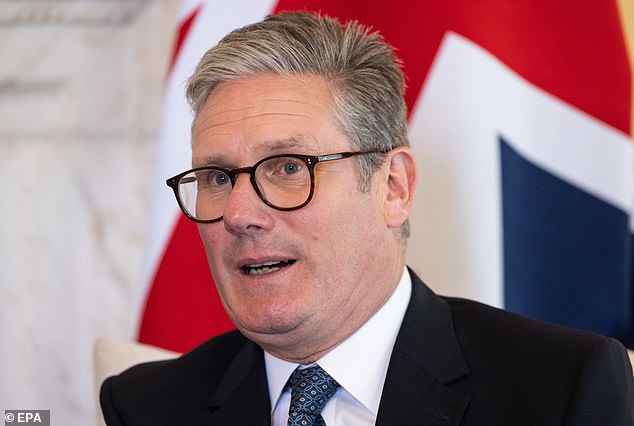Table of Contents
Thank goodness Sir Keir Starmer is not a doctor.
His manner with patients is so taciturn – and his voice so mournful – that he could probably persuade them to turn off their own life-support machines.
And judging by the distinctly unoptimistic tone of his State of the Nation address in the Rose Garden of Number 10, it is entirely credible that Starmer was telling the truth after all when he said during one of the pre-election debates that he would rather leave his relatives in long NHS queues than have them do it privately.
The truly disconcerting thing about Starmer is that he came to power just a few weeks ago with so much goodwill and an overwhelming majority. He is the one who should be rejoicing: after all, he won.
It is common for a new prime minister to blame the old guard for all problems, but his prognosis and pessimism are hardly worthy of parody.
Pessimistic: PM hinted at tax rises as he warned autumn budget will be ‘painful’ for Britain
Not only has he found an economic black hole – which is pure sophistry – but also a “social black hole”.
And the prime minister managed to keep a straight face by saying this without mentioning the sky-high levels of immigration that are putting so much pressure on public services and housing. You can disagree with Starmer’s diagnosis, but you have to accept that the UK is in trouble.
We have too many people deemed economically inactive; low levels of productivity, particularly in the public sector; expensive housing; poor transport links above Watford Gap and an addiction to cheap labour, particularly in the NHS and care services.
Why, for example, has the Government not increased the number of British students allowed to study medicine each year?
What happened to promises of change? Or, indeed, to any acknowledgement that Britain is not doing so badly after all, given the extraordinary £400bn hit to public finances due to the costs of the Covid-19 lockdown?
Or the global inflationary pressures that were unleashed when central banks printed more money, as well as rising energy costs due to Russia’s war in Ukraine.
Yet Starmer has not proposed a single positive idea or policy that could help solve any of these problems.
Starmer’s response, however, is to offer more of the same policy mix pursued by the Conservatives over the past decade.
This means more pain and higher taxes in the Halloween Budget in October.
Starmer is sticking to his promise that taxes will not rise for “working people”, so we can expect higher taxes on everything related to wealth: inheritance tax, capital gains, pension relief, savings and even council tax are all up for grabs.
But the fact that higher taxes will not affect “workers” – which is most of us – is another of their fantasies, since taxes do not always fall on the person who pays them. Taxes on investments or companies, for example, will also affect workers.
It is interesting that criticism of Starmer’s economic strategy is not only coming from Conservatives, but also from many economists and Labour supporters, and not just from those on the far left.
They are equally concerned that Starmer, along with his chancellor, Rachel Reeves, are leading us into a period of George Osborne Mark 2-style austerity. Indeed, it is difficult to draw a line between Osborne and Reeves. The prime minister could easily have shown a bit of optimism, acknowledging that the UK is turning a corner, which would have given a boost to confidence.
Starmer could have admitted that the country is growing again, that it is the fastest growing of the G7, much healthier than Germany, which is in recession territory, or France, which has no government.
Instead, he’s serving up a plate of cold vengeance. Maybe that’s his strategy.
Or perhaps it has no serious political background and Labour is once again a creature of the unions, which is why it has not demanded productivity improvements in return for higher wage settlements.
Does he hope that by making the present seem so terribly miserable, the future will only seem brighter?
The problem with this strategy is that Starmer and Reeves would be trapped in a dangerous one-way street.
They will become so entrenched in their narrow ideology of high taxes and austerity that it will be difficult for them to change course.
And in the process, they could harm the very growth they’ve been promising.
More change.
DIY INVESTMENT PLATFORMS

AJ Bell

AJ Bell
Easy investment and ready-to-use portfolios

Hargreaves Lansdown

Hargreaves Lansdown
Free investment ideas and fund trading

interactive investor

interactive investor
Flat rate investing from £4.99 per month

Saxo

Saxo
Get £200 back in trading commissions

Trade 212

Trade 212
Free treatment and no commissions per account
Affiliate links: If you purchase a product This is Money may earn a commission. These offers are chosen by our editorial team as we believe they are worth highlighting. This does not affect our editorial independence.

